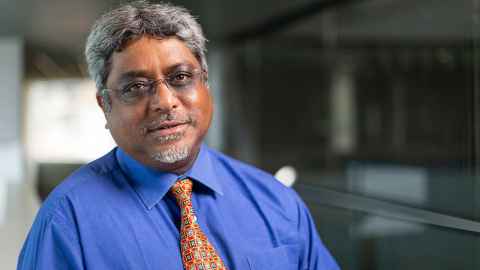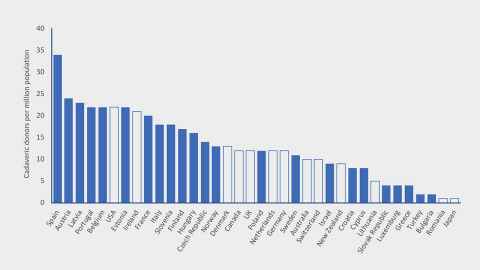Ananish Chaudhuri says thought is needed even when just ticking a box
1 June 2021
Opinion: Issues of choice face us every day and sometimes important ones are made by ticking a box. Professor Ananish Chaudhuri says we all need to consider how information is framed.

At any point in time, a large number of people around the world are waiting for an organ transplant.
There are also a lot of people who could choose to donate their organs, especially in the event of their death. But the majority of us who can donate organs following death choose not to.
Take a look at the figure below. This is based on data from a 2006 paper written by two Harvard economists and shows the differing rates of organ donations across European countries at the time. (The rates will be similar today.) Even if you look at countries located next to each other, such as the Netherlands and Belgium, you will see big differences. Belgium is doing better than the Netherlands and has access to many more organ donors.
You may be tempted to frame these differences in terms of these countries’ culture, history and demographics. But it turns out these differences are caused by a single question on driver licence forms. Some countries ask applicants: “Would you like to be an organ donor? If so, check the box below.” Other countries state: “We will assume that, in the event of your death, you will be willing to donate your organs. If you are not willing to do so, then check the box below.”
It may be surprising but the fact is that, in the first case, people do not check the box, and therefore, do not become organ donors.
In the second case, people also do not check the box, and therefore, become organ donors by default. Now look at the figure again. Guess what is common to all the countries that have higher rates of organ donation?
They all provide the second option: “check the box if you do not want to donate your organs”. This is the presumed consent or the ‘opt-out’ option. You are automatically an organ donor unless you opt out by checking the box. The countries that do not do well on the organ donation scale are the ones that provide the first option: “Do you wish to donate?” You are not an organ donor unless you specifically opt in. All of this over a simple decision (or the lack of one) to check a box!

As humans we put a lot of faith in our ability to make rational decisions.
Similar issues of choice arise when people plan for their retirement.
Most organisations around the world have a system for matching employee contributions to a pension fund. So, if you make $100,000 per year, contribute 6.5 percent toward your superannuation and your employer matches it, then you end up with $13,000 at the end of the year.
Of course, typically, you cannot touch this money until you retire. But given compound interest, amounts saved grow quickly. For most, if not all of us, it makes perfect sense to sign up to such plans. But by now, you know where I am headed. A lot of people do not sign up.
Is it because the ones not signing up are financial wizards who have better ideas on how to invest their money? No. It is simply because around the world, some employers choose the ‘opt-in’ option: they ask the employee to check a box if they wish to join. Many employees do not check this box and do not join. Other employers rely on the ‘opt-out’ option. They enrol employees automatically.
Employees can check a box if they don’t wish to join. Most employees do not check this box and therefore remain enrolled. A 2013 report in The Guardian found that a year after Britain introduced automatic enrolment with an opt-out feature, there were 1.6 million more savers in workplace pensions. Only nine percent opted out.
This is a serious issue because around the world many people do not manage to save enough for retirement, hence poverty rates among the elderly are quite high and the aged are often overly reliant on social safety nets.
As humans we put a lot of faith in our ability to make rational decisions; yet evidence suggests that our rationality is ‘bounded’. There are limits to our cognitive abilities to think through problems, especially problems that are complex or that we experience infrequently. And such ‘bounded’ rationality makes a difference in myriad circumstances.
Thinking of buying a house? If I took a group of buyers and showed half of them an asking price that is $200,000 higher than the other half, it is nearly certain that the former group will bid a higher amount than the latter. And no, even seasoned real estate agents are not immune to such framing effects.
The rapidly advancing field of behavioural economics infuses psychological insights into traditional economic models to better understand the nuances of human decision-making and figure out how we can design institutions for greater good, and at the same time prevent people from falling victim to a wide range of cognitive errors that characterise many of our day-to-day decisions.
Ananish Chaudhuri is Professor of Behavioural and Experimental Economics in the Business School. He has two new books out, Behavioural Economics and Experiments (Routledge, 2021) and A Research Agenda for Experimental Economics (Ed.) (Edward Elgar, 2021)
The views in this article reflect personal opinion and are not necessarily those of the University of Auckland.
This article first appear in the June 2021 edition of UniNews.